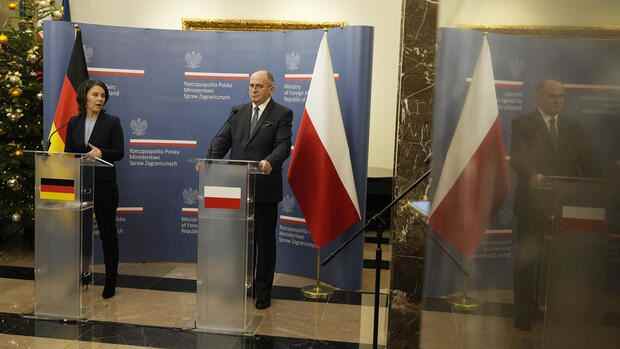The new German Foreign Minister meets her Polish counterpart for the first time. After Paris, Warsaw is the second national capital to which the first head of the Foreign Office has traveled. In between she was in Brussels – at the EU and NATO.
(Photo: AP)
Berlin That cannot be called a warm welcome for the new German Foreign Minister Annalena Baerbock in Poland. On numerous posters, Angela Merkel and Frank-Walter Steinmeier stand in line with Adolf Hitler and Joseph Goebbels.
The text on this: “Can those responsible in Germany, who are so interested in the rule of law in other countries, finally deal with Germany’s scandalous lawlessness and pay Poland reparations for the damage and war crimes of World War II?”
There it is again, the reference to the “Third Reich” of the Nazis, which the ruling national-populist party Law and Justice (PiS), tries again and again. PiS boss Jaroslaw Kaczynski already speaks of building a “Fourth Reich” – the more the PiS falls in the polls, the more shrill the demands and accusations become.
Baerbock is also confronted with this stance: he expects the new German government to be ready to talk about reparations, said Poland’s Foreign Minister Zbigniew Rau after his first meeting with Baerbock on Friday in Warsaw.
Top jobs of the day
Find the best jobs now and
be notified by email.
Baerbock had already laid a wreath at the tomb of the unknown soldier. Hitler’s Germany had invaded Poland and murdered millions of people, and had built most of its extermination camps on occupied Polish territory.
Baerbock relies on the principle of hope
But despite all the aftermath of the past, the present dominates the visit of the first head of the Foreign Office. And that is the ongoing conflict between Poland and the EU institutions over compliance with civil rights in the Member State Poland. Above all, the EU urges the independence of the judiciary in Poland.
Baerbock remained diplomatic – in contrast to the previous green party line, relying on the position of the resigned Chancellor Angela Merkel: If the discrepancies are very large, as on the subject of the values of the European Union, “it is all the more important to be very intensive on these issues To be conversation “, said the Green politician on Friday after her meeting with Rau in Warsaw.
So far, the Greens and the SPD in particular have urged the European Parliament to withhold EU funding if recipient states – such as Poland and Hungary – restrict civil rights, freedom of expression and the independence of the judiciary. Merkel had warned of an escalation right up to the end and relied on a negotiated solution.
She now wants to look for a solution bilaterally and at European level, said Baerbock in Warsaw. And then, when asked whether, after her talks in Warsaw, she had the hope that Poland could give way in the legal dispute, she replied: “In foreign policy and diplomacy in particular, you don’t just need a little diplomatic luck, you always need it too Hope.”
The bilateral relations are characterized by ambivalence
However, Baerbock has not given in to Warsaw: she raised the issue of values and civil rights at her meetings, emphasized the new German chief diplomat. “That makes for strong friendships, even if it’s inconvenient,” said Baerbock, who has now visited Warsaw after Paris and Brussels – and will meet the foreign ministers of the seven largest industrialized countries (G7) in Liverpool at the weekend.
The relationship with the Green Foreign Minister is ambivalent, especially in Warsaw: While the PiS government feels under pressure on questions of the rule of law, across all parties, the Polish opposition in particular combines hope with the critical stance of the Greens. The opposition needs pressure from Brussels and Berlin to push back the toughest anti-democratic reforms of the PiS in Poland. “Especially when it comes to the rule of law and human rights, we cannot allow Europe’s foundations to crumble,” emphasized Baerbock.
It is also fitting that Baerbock – in contrast to her predecessors Heiko Maas and Sigmar Gabriel (both SPD) – will meet Foreign Minister Rau and President Andrzej Duda as well as Ombudsman Marcin Wiącek on their inaugural visit to Warsaw. The ombudsman is the point of contact for Poles who are dissatisfied with the work of the authorities. Poland is fighting hard with the EU to ensure compliance with European values and civil rights as well as the controversial Polish judicial reform.
Dispute threatens over the further role of the EU
However, the government and opposition in Warsaw share a tough stance with the new German ruling party towards Russia and the controversial Nord Stream 2 Baltic Sea pipeline. Baerbock had diplomatically sent the role of Germany in her speech on taking over official duties in the Foreign Office even before her arrival on the Vistula and Berlin in relation to the smaller EU members underlined: “We will not pursue our ideas and interests over the heads of our neighbors, and certainly not at their expense.”
But the PiS government remains skeptical about the change of government in Berlin. Because the SPD, Greens and FDP want the EU to take the form of a European federal state. This postulate is laid down in the coalition agreement. Poland’s government, on the other hand, wants the EU as an association of largely independent nation states. Only the internal market is important for Warsaw. Poland’s economy is a particular success story for the EU – thanks in part to the internal market.
On Sunday, the new Federal Chancellor Olaf Scholz (SPD) will come to Warsaw for his inaugural visit – he too will travel to Paris and Brussels beforehand. Poland’s Prime Minister Mateusz Morawiecki is already calling for the end of Nord Stream 2 from Scholz.
More: These are the challenges for the first German female foreign minister
